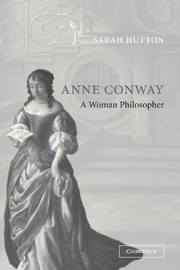Book contents
- Frontmatter
- Contents
- Acknowledgements
- Introduction
- 1 Anne Finch, Viscountess Conway
- 2 A philosophical education
- 3 Religion and Anne Conway
- 4 Anne Conway and Henry More
- 5 John Finch, Thomas Hobbes and Margaret Cavendish
- 6 Experimental physick: Boyle, Greatrakes, Stubbe
- 7 Physic and philosophy: Van Helmont, father and son
- 8 Kabbalistical dialogues
- 9 Quakerism and George Keith
- 10 Last years
- 11 Legacy
- Bibliography
- Index
7 - Physic and philosophy: Van Helmont, father and son
Published online by Cambridge University Press: 22 September 2009
- Frontmatter
- Contents
- Acknowledgements
- Introduction
- 1 Anne Finch, Viscountess Conway
- 2 A philosophical education
- 3 Religion and Anne Conway
- 4 Anne Conway and Henry More
- 5 John Finch, Thomas Hobbes and Margaret Cavendish
- 6 Experimental physick: Boyle, Greatrakes, Stubbe
- 7 Physic and philosophy: Van Helmont, father and son
- 8 Kabbalistical dialogues
- 9 Quakerism and George Keith
- 10 Last years
- 11 Legacy
- Bibliography
- Index
Summary
Before the controversies between More, Stubbe and Boyle had played themselves out, a new figure entered Anne Conway's life. This was Francis Mercury van Helmont (1614–98), whom she first encountered in 1670. Physician, alchemist, inventor, diplomat, religious seeker, natural philosopher and Christian kabbalist, Francis Mercury van Helmont is a colourful figure who defies classification in modern terms. Anne Conway's contact with him was to have a decisive impact on her thinking and outlook in her last years. The importance of Francis Mercury van Helmont for Anne Conway was, of course, not confined to medicine, and cannot be adequately covered in a single chapter. Like More, Van Helmont was someone who had a far-reaching impact on her thinking, as she did on his. His crucial importance in introducing her to Quakerism and kabbalism is too large a topic to discuss here and will be dealt with in later chapters. In this chapter we shall meet him in the capacity in which he first entered her life, namely as a physician. In that capacity he certainly had his own distinctive medical philosophy, but it originated from the natural philosophy of his famous father, Jan Baptiste van Helmont (1579–1646), whose legacy Francis Mercury had been responsible for collecting and publishing. Together, Jan Baptiste van Helmont and his son Francis Mercury were by far the most important of the many medical and natural philosophers whose chemical and biological theory forms the background to Lady Conway's treatise.
- Type
- Chapter
- Information
- Anne ConwayA Woman Philosopher, pp. 140 - 155Publisher: Cambridge University PressPrint publication year: 2004



